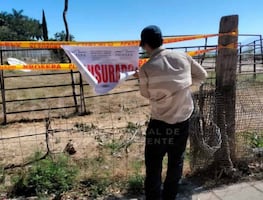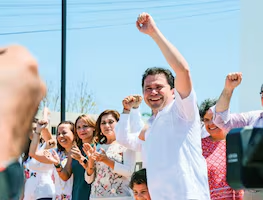Más Información

Tras supuesto rechazo de avión con deportados, SRE asegura que hay buena relación con EU; “cooperamos con respeto”, dice

Clausuran temporalmente relleno de escombros en Jocotepec, Jalisco; Semartnat aclara que no hay permiso

FGR investiga a Mauricio Sahuí, delegado del Infonavit en Yucatán; está ligado al Cártel Inmobiliario de “Los Mañé”
Costa Rica
became the latest country to legalize same-sex marriage early Tuesday when a ruling from its supreme court went into effect ending the country’s ban.
Couples held ceremonies—mostly private due to the COVID-19 pandemic , but some that were broadcast—to celebrate their unions before judges and notaries after the ban was lifted at midnight.
Two women in their 20s married just after midnight in an outdoor service performed by a notary wearing a face mask who pronounced them “wife and wife.”
Recommended: 25 countries embrace same-sex marriage
Costa Rica
is the sixth country in Latin America to legalize same-sex marriage , following most recently Ecuador , which allowed it last year. It is also permitted in some parts of Mexico .
Recommended: Eight years of equal marriage in Mexico, advances and setbacks
The issue took center stage in Costa Rica’s 2018 presidential election after the Inter-American Court of Human Rights issued an opinion that countries like Costa Rica , which had signed the American Convention on Human Rights , had to move immediately to legalize gay marriag e.
It helped propel President Carlos Alvarado to victory over an evangelical candidate, Fabricio Alvarado , who had campaigned against it.
In August 2018, Costa Rica ’s supreme court said the country’s ban was unconstitutional and gave the congress 18 months to correct it or it would happen automatically. The Legislative Assembly did not act, so at midnight the law banning same-sex marriage was nullified.
A campaign celebrating the change called “ I do ” planned a series of events including hours of coverage on state television and messages from celebrities, including Michelle Bachelet , the United Nations commissioner for Human Rights .
Gia Miranda, director of the “ I do ” campaign, said television coverage would also include segments on the movement’s history in Costa Rica .
“It gives us so much joy,” Miranda said. “The only thing that could win with this is Costa Rica and in general love.” She said it would help decrease discrimination and make the country more prosperous and attractive to tourists.
sg







